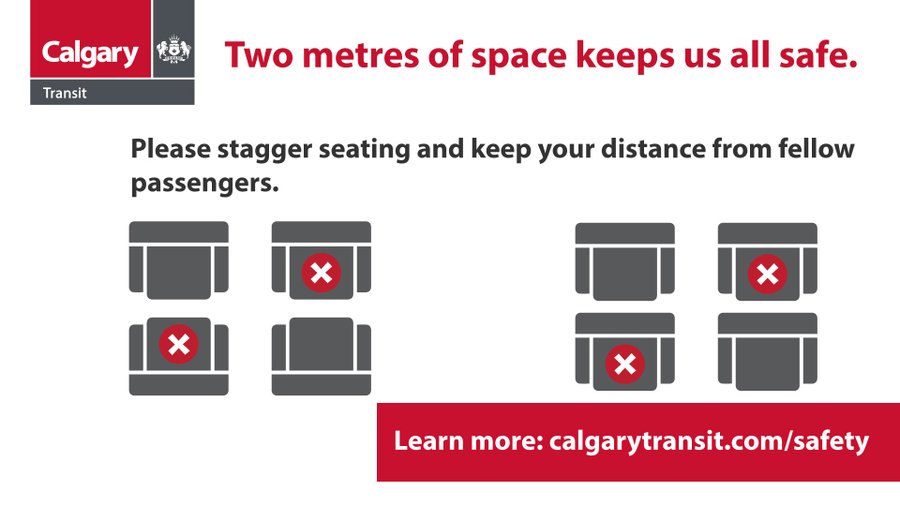Many changes are coming to Calgary Transit as officials continue to try to keep those who rely on the essential service safe during the COVID-19 pandemic.

In a series of four tweets on Wednesday, Calgary Transit explained that starting on April 1, they would be limiting seating and standing areas on buses, trains and shuttles to implement a two-metre distance between riders.
According to city officials, there will also be fewer buses and trains and they will be doing fewer runs of routes by Monday, April 6.
“We know that transit is critical for some, it’s the only way to get to their essential work, it’s the only way for them to get to health care, it’s the only way for them move around the city, and so we know we need to maintain transit as much as possible,” Calgary Emergency Management Agency chief Tom Sampson said.
“But at the same time, we’re not seeing the ridership.”

Public transit ridership has gone down about 80 per cent, said Calgary Transit acting director Russell Davies.
Despite the changes to seating and the number of vehicles servicing the routes, officials said people don’t have to worry about a lack of access.

Get weekly health news
Mayor Naheed Nenshi advised riders to check the times for their routes to make sure they’re aware of time changes.

Davies said transit operators won’t be responsible for enforcing the new social distancing measures, adding that they hope riders will take it upon themselves to be extra cautious while using public transit.
The city also extended low-income and seniors’ passes purchased in March through to the end of April.
City losing money
Nenshi said the city is “losing a lot of money” during the pandemic, though he maintained that his primary concern is making sure Calgarians are OK.
“We are losing, early estimates say, between $10 million and $15 million as your city government,” Nenshi said.
The mayor said for those concerned about bills like property taxes, the city is working on a “good solution.”
He said the city is more limited when it comes to disposable money than other levels of government, adding the city can’t run a deficit.

Nenshi said a proposal for how to deal with property taxes is set to go before city council on Monday.
“We are committed to ensuring that your property tax bill, the things that the city is working on, shouldn’t cause you undue stress,” Nenshi said.
State of local emergency to be extended
The city’s state of local emergency, declared on March 15, will also be extended again, Sampson said.
He reminded people that the precautions the city is taking in terms of closures and restrictions are serious and need to be obeyed, including at places like skate parks and playgrounds.
Sampson said there have been instances where signs and fencing around those areas have been torn down or people are jumping over them to get inside, which he said was “not cool.”
“If you get COVID as a youngster and you pass it along to your grandparents and they subsequently pass away, or they’re critically ill, you will not forgive yourself for some time,” Sampson said.
“So I’m imploring you, don’t go to the skate parks.”

Nenshi said while some other municipalities across the country have set specific end dates for their states of emergency, Calgary isn’t in a position to do so yet.
However, all city events have been cancelled through the month of April.
The city’s self-isolation order, issued on March 17 was also rescinded in light of the federal government’s move to make identical measures mandatory across the country.






Comments
Want to discuss? Please read our Commenting Policy first.